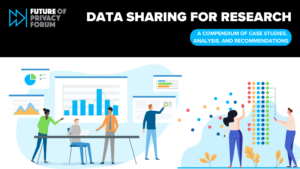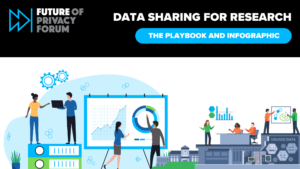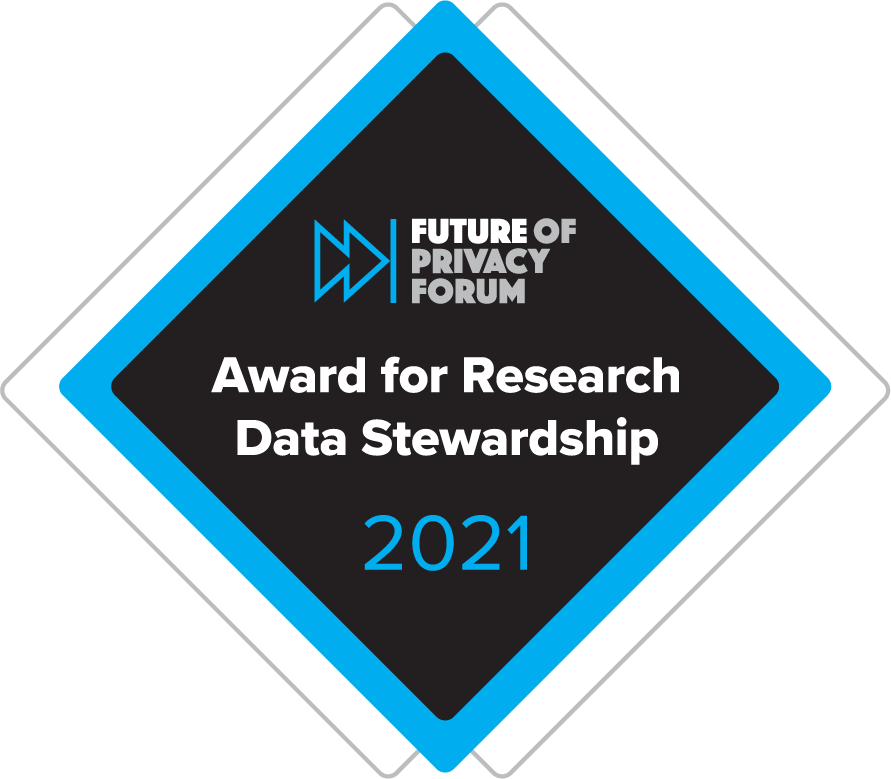Research often requires using sensitive data to answer important questions. The ethical collection and analysis of personal information can be challenging to do while still protecting the privacy of the implicated individuals, honoring informed consent, and complying with other legal obligations. The technology, policies, and ethical considerations for researchers are constantly shifting, sometimes making it difficult to keep up. That’s why FPF engages stakeholders across academia and industry to produce recommendations, best practices, and ethical review structures that promote responsible research. Our work is centered around streamlining, encouraging, and promoting responsible research that respects essential privacy and ethical considerations throughout the research lifecycle. FPF works with policymakers to develop legislative protections that support effective, responsible research with strong privacy safeguards, including hosting events that allow policymakers and regulators to engage directly with practitioners from academia, advocacy, and industry.
FPF also has an Ethics and Data in Research Working Group. This group receives late-breaking analysis of emerging legislation affecting research and data, meets to discuss the ethical and technological challenges of conducting research, and collaborates to create best practices to protect privacy, decrease risk, and increase data sharing for research, partnerships, and infrastructure. Learn more and join here.
Featured
New FPF Report: Demystifying Data Localization in China – A Practical Guide
On February 21, 2022, FPF published a report detailing China’s data governance framework for data localization and cross-border transfers. The report outlines 10 steps organizations can take before deciding to localize or transfer data, with practical advice on how to carry out each of them. By examining provisions of relevant laws and administrative regulations passed […]
Overcoming Hurdles to Effective Data Sharing for Researchers
In 2021, challenges faced by academics in accessing corporate data sets for research and the issues that companies were experiencing to make privacy-respecting research data available broke into the news. With its long history of research data sharing, FPF saw an opportunity to bring together leaders from the corporate, research, and policy communities for a conversation […]
Organizations must lead with privacy and ethics when researching and implementing neurotechnology: FPF and IBM Live event and report release
A New FPF and IBM Report and Live Event Explores Questions About Transparency, Consent, Security, and Accuracy of Data The Future of Privacy Forum (FPF) and the IBM Policy Lab released recommendations for promoting privacy and mitigating risks associated with neurotechnology, specifically with brain-computer interface (BCI). The new report provides developers and policymakers with actionable […]
Data Sharing … By Any Other Name
There are many different uses of the term “data sharing” to describe a relationship between parties who share data from one organization to another organization for a new purpose. Some uses of the term data sharing are related to academic and scientific research purposes, and some are related to transfer of data for commercial or government purposes. ..it is imperative that we are more precise which forms of sharing we are referencing so that the interests of the parties are adequately considered, and the various risks and benefits are appropriately contextualized and managed.
Five Things Lawyers Need to Know About AI
Lawyers are trained to respond to risks that threaten the market position or operating capital of their clients. However, when it comes to AI, it can be difficult for lawyers to provide the best guidance without some basic technical knowledge. This article shares some key insights from our shared experiences to help lawyers feel more at ease responding to AI questions when they arise.
Brain-Computer Interfaces: Privacy and Ethical Considerations for the Connected Mind
BCIs are computer-based systems that directly record, process, analyze, or modulate human brain activity in the form of neurodata that is then translated into an output command from human to machine. Neurodata is data generated by the nervous system, composed of the electrical activities between neurons or proxies of this activity. When neurodata is linked, or reasonably linkable, to an individual, it is personal neurodata.
Blog Summary: Ethical Concerns and Challenges in Research using Secondary Data
Digital data is a strategic asset for business. It is also an asset for researchers seeking to answer socially beneficial questions using company held data. Research using secondary data introduces new challenges and ethical concerns for research administrators and research ethics committees, like IRBs. FPF Senior Researcher, AI & Ethics, Dr. Sara Jordan, analyzes some […]
Stanford Medicine & Empatica, Google and Its Academic Partners Receive FPF Award for Research Data Stewardship
The second-annual FPF Award for Research Data Stewardship honors two teams of researchers and corporate partners for their commitment to privacy and ethical uses of data in their efforts to research aspects of the COVID-19 pandemic. One team is a collaboration between Stanford Medicine researchers led by Tejaswini Mishra, PhD, Professor Michael Snyder, PhD, and […]
Research from Stanford Medicine and Empatica, Inc: Early Detection of COVID-19 Using Empatica Smartwatch Data
Tejaswini Mishra, PhD, Michael Snyder, PhD, Erika Mahealani Hunting, Alessandra Celli, Arshdeep Chauhan, and Jessi Wanyi Li from the Stanford University School of Medicine’s Department of Genetics, and Empatica Inc. are the recipients of the second-annual FPF Award for Research Data Stewardship. The collaboration between the research team from Stanford Medicine and Empatica, a medical […]
Google: COVID-19 Community Mobility Reports
Google has been recognized with the second-annual FPF Award for Research Data Stewardship for its work to produce, aggregate, anonymize, and share data on community movement during the COVID-19 pandemic. Google’s Community Mobility Reports go through a robust anonymization process that employs differential privacy techniques to ensure that personal data, including an individual’s location, movement, […]













